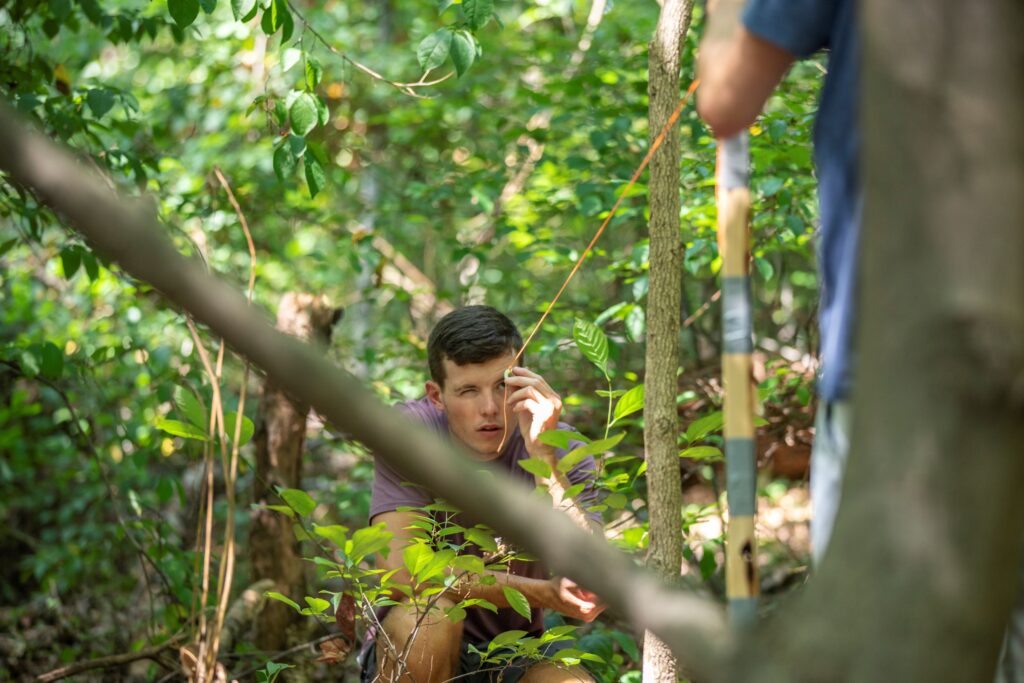Real-world experience in their field is often what helps successful entry-level job seekers stand out from their competitors. According to Dr. Tamara Johnstone-Yellin, Associate Professor of Biology and Environmental Science, this hands-on experience is particularly important in the sciences.
“Internships give students practice with the soft skills—speaking, writing, working with others—and gives them confidence,” Johnstone-Yellin said. “It also demonstrates to an employer that they are willing to show up and work hard even in crummy weather.”
Trevor Sager ’24, a biology major from Toms Brook, Va., leveraged an internship with the Virginia Department of Conservation and Recreation (DCR) during his senior year into a DCR job after graduation. As an intern, Sager worked on identifying plants and mapping invasive species along the South River watershed in and around Waynesboro, Va. Now, as a Stewardship Technician, Sager is working to support habitat restoration in the same region. Depending on the day, Sager said he may be removing invasive plants, preparing sites for new plantings or maintaining department equipment.
Sager said he loves spending his days outside and seeing the impact that his work has on the natural habitat. And he credits his internship with both confirming that this was the type of work that he wanted to do and proving to DCR that he was capable of the work.
“They saw that I worked hard as an intern and it was a no-brainer for them to hire me,” Sager said.
Sometimes internships show students what careers they don’t want to pursue. That was the case for Capt. Rob Ham ’05 from Bridgewater, Va. Ham was a biology major at BC who volunteered with the Bridgewater Rescue Squad and interned with Rockingham Fire Rescue during college. Although he continues to volunteer, his internship confirmed that he didn’t want to do that work on a fulltime basis. Dr. Michael Hensley, Harry G. M. Jopson Professor of Biology, Emeritus, suggested that Ham look into a career in wildlife management, instead.
Ham’s first job out of college was working as a Conservation Police Officer for the Virginia Department of Wildlife Resources, the state law enforcement agency charged with managing hunting, boating and fishing in the commonwealth. Over the past nearly 20 years, Ham worked his way up to his current role as Police Captain in charge of accreditation programs, risk management and strategic planning. It is a role and an organization that he feels is a perfect fit.
“I originally thought I’d work for DWR for five years and then, perhaps, go back to school,” Ham said. “But I have loved every bit of my work.”
Over the years that work has included supervising interns, including some from Bridgewater.
“All of our Bridgewater interns have been very successful,” Ham said. “They are always motivated and on time and I know the experience will help them” in whatever they do for a future career.
One of those interns was Shelby Foosness ’21, an environmental science major from Spotsylvania, Va. Foosness completed an internship with the DWR Conservation Law Enforcement Program during her senior year. The department was up for reaccreditation, and Foosness was assigned the task of using the policy manual to develop test questions to quiz the field staff on policies.
Although that internship didn’t lead to a job with DWR, Foosness said it gave her experience working in a professional environment and in being self-motivated to complete work without deadlines or schedules.
“I am a very shy and reserved person, so the experience helped push me out of my comfort zone,” Foosness said. “It prepared me for my current job where I work and interact with many different people with many different backgrounds on a regular basis.”
Foosness now works as a Conservation Specialist and Dam Technician for the Shenandoah Valley Soil and Water Conservation District. Her position includes working with agricultural producers to improve water quality through practices such as excluding livestock from streams, constructing animal waste storage facilities and implementing cover crop. She also manages several flood control dams in Rockingham County, Va.
But internships aren’t the only way for students to get hands-on experience. In Johnstone-Yellin’s wildlife biology classes, for example, students spend much of the class conducing field research or lab work.
This year, students are working with Snapshot USA, a project that compiles information on mammals gathered from wildlife cameras. BC students have set cameras in various locations in and around the town of Bridgewater and will be identifying photographed wildlife later this semester. Their research will contribute to the nationwide project, sponsored by the Smithsonian Institution and the North Carolina Museum of Natural History, and eventually will be shared with the public.
Students are also researching and writing wildlife management plans for selected species of animals across Virginia. In this semester-long project, they will be reaching out to field biologists with expertise on their species for feedback on their plans.
“They are getting practical experience connecting with working biologists and seeing what is involved in putting together things like a budget and an evaluation of their plan,” Johnstone-Yellin said.
Whether in the lab or in the field, staff in the BC Center for Career Development encourage students to get as much hands-on experience as possible before graduation. The Center provides a variety of programs to encourage students to build the connections and get the experience that will put them ahead of their competition.
For more on the classes and internships available to students, visit the Department of Biology & Environmental Science website.
– Heather S. Cole
11/11/24


